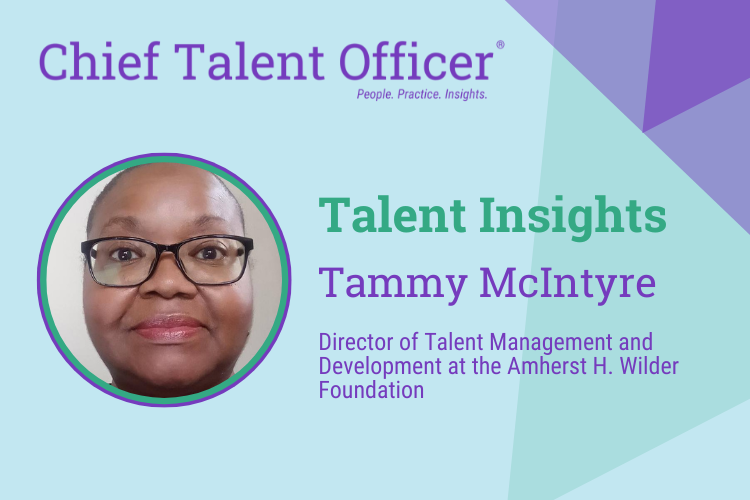Chief Talent Officer’s “Talent Insights” series is dedicated to sharing the insights and expertise of influential talent executives. In this Q&A series, we garner strategic insights, innovative approaches and challenges overcome from C-suite talent and HR executives, chief talent officers, chief people officers and more who are shaping the future of talent management.
What initially drew you to a career in talent management, and how have your experiences in the field evolved over the years?
I am committed to helping people get “unstuck” and take charge of their careers. I recall a time in my career, when I was stalled and could not navigate the organization. Mentors helped me to strategically move toward my goals. It was this determination and my love for people development that drew me to the field of talent management. I started out helping co-workers develop individual development plans, which led to succession planning and talent development with my current employer.
What core values and principles do you believe are essential for building a positive and inclusive company culture?
I believe compassionate leadership, humility and uplifting mankind are essential for building a positive and inclusive culture. Honoring lived experiences of all generations within an organization is also important. At any time, organizations can have four to five generations working together. These groups have varying perspectives on topics such as employee loyalty, compensation and continuous contributions. We have to consider all of these differences as we aspire to be inclusive companies.
“As we improve our capacity to ask for and receive feedback, we improve team dynamics and team performance.”
Can you share a significant challenge you’ve faced as a talent leader and how you successfully navigated through it?
Recruiting the best available talent was challenging for all of us during the pandemic. I navigated through this phase by looking at strategies that did not work during a crisis environment and occasionally utilizing unconventional approaches that may not be considered a best practice. This approach to talent has inherent risks, but due diligence helped me to mitigate any talent risks.
What strategies have you found most effective in attracting and retaining top talent in competitive industries?
Pursuing talent that is right in front of me has been extremely beneficial and a fruitful means of retaining top talent. Creating partnerships that allow for transfer of ideas and learning from employer advisory groups has also helped me to identify unique talent streams and glean strategies.
How do you balance advocating for employees’ needs while aligning with your company’s business objectives?
I integrate business needs with what employees are requesting. I also alternate between employee needs and business needs as I prioritize projects each fiscal year. One strategic goal for the next three years is to provide resilience support for our employees and their families, just as we support our clients and their families.
What leadership skills do you prioritize and cultivate as a senior talent leader to inspire your team and drive talent initiatives?
Coachability is encouraged and integrated into our leadership development model. As we improve our capacity to ask for and receive feedback, we improve team dynamics and team performance. Personally, I live by this principle and it is encouraged at every level within the organization. Performance management and proactive determination of bench strength are also skills I hone to develop and retain leadership talent.
What game-changing advice would you offer if you could go back in time and mentor your younger self?
Take advantage of all leadership development opportunities that give you access to growth opportunities and visibility. Seek several mentors as you climb the leadership apex. Never stop learning new capabilities and reskill when needed. Keep your skills up to date by using them. Don’t be so concerned with what others think about you. Find your strength and personal power within yourself. Don’t be afraid to pivot or take the “exit ramp,” it may lead you to where you ultimately want to go.
What do you feel is currently the single biggest challenge facing talent professionals and the industry as a whole?
New hires are constantly asking for promotions and salary increases as soon as they board with the employer, without demonstration of skills or value add. I believe this is the biggest challenge facing talent professionals and HR. Misaligned compensation is also a significant challenge. Salary offers are inflated out of desperation to hire, but market benchmarks are not.
We’re always looking to showcase innovative tools and technologies. Can you share one tech product or platform that has significantly improved your work processes and why you find it valuable?
Webex has allowed our organization to improve employee access to remote development opportunities. This platform has made it possible for all employees to attend shared learning opportunities, regardless of their position or location.
Interested in being featured in our “Talent Insights” series? Please complete this FORM.
















